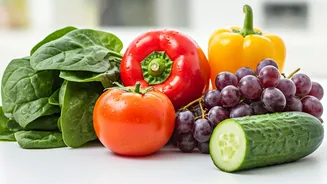Kidney Health Explained
The kidneys play a crucial role in our body, performing the vital function of filtering waste products from the blood. They also help to regulate blood pressure,
maintain electrolyte balance, and produce hormones essential for red blood cell production. Maintaining kidney health is therefore paramount for overall well-being. Proper kidney function ensures that toxins and excess fluids are effectively removed from the body, preventing the buildup of harmful substances. This crucial process supports the body's natural detoxification mechanisms and protects against various health complications. In this article, we'll explore some easily accessible foods that can promote kidney health. These foods are packed with nutrients and compounds that support kidney function and aid in detoxification.
Beetroot: Kidney Support
Beetroot is a nutritional powerhouse often overlooked. It's rich in antioxidants and nitrates, both of which are beneficial for kidney health. Nitrates can help improve blood flow, which in turn supports kidney function. Antioxidants combat oxidative stress, protecting the kidneys from damage. Consuming beetroot can aid in the detoxification process, which is essential for kidney function. Beetroot's natural compounds support the removal of toxins from the body. You can incorporate beetroot into your diet through salads, juices, or cooked dishes. Regular consumption of beetroot can be a simple yet effective strategy to support kidney health. When incorporating beetroot into your diet, it is always advisable to consume it in moderation.
Cranberries: Urinary Tract
Cranberries are widely known for their positive effects on urinary tract health, but they also offer benefits for kidney function. They contain compounds that can help prevent bacteria from adhering to the urinary tract walls. This action can reduce the risk of urinary tract infections, which, if left untreated, can potentially harm the kidneys. Furthermore, cranberries have antioxidant properties, protecting the kidneys from oxidative damage. Drinking cranberry juice (unsweetened) or eating fresh cranberries can be a helpful addition to your diet. Be sure to opt for unsweetened varieties to minimize added sugars, which can negatively affect kidney health. Incorporating cranberries can contribute to a healthier urinary system and support overall kidney function.
Red Bell Peppers
Red bell peppers are a great choice for kidney-friendly eating. They are low in potassium, which is particularly beneficial for those with kidney issues, as excessive potassium can burden the kidneys. Red bell peppers are packed with vitamins, including vitamin C and antioxidants. These components protect the kidneys against damage caused by free radicals. Vitamin C supports the immune system, aiding the body's ability to fight off infections. You can easily include red bell peppers in your diet by adding them to salads, stir-fries, or roasted dishes. Their versatility and nutritional benefits make them an excellent choice for supporting kidney health. Red bell peppers are a tasty and healthy way to support kidney health and overall well-being.
Cabbage: Detoxification Aid
Cabbage is another excellent food for kidney detoxification. It is low in potassium, making it a good choice for those needing to monitor their potassium intake. Cabbage contains antioxidants and phytonutrients that support kidney function and protect against oxidative stress. These compounds contribute to the detoxification process, helping the kidneys function more efficiently. Cabbage is also a versatile vegetable, which can be eaten raw in salads or cooked in various dishes, like soups and stews. Consuming cabbage provides the body with essential nutrients to support kidney health. Adding cabbage to your diet can be a simple and effective step toward maintaining healthy kidneys and enhancing your overall health. It is a nutritious addition to any meal plan.
Cauliflower: Kidney-Friendly Choice
Cauliflower is a kidney-friendly food packed with beneficial compounds. It is low in potassium, making it suitable for those who need to limit their potassium intake. Cauliflower is rich in vitamin C, vitamin K, and folate, all of which support overall health. These nutrients play a crucial role in maintaining optimal kidney function. The antioxidants in cauliflower help to protect the kidneys from damage. Cauliflower can be steamed, roasted, or added to various recipes. Its versatility makes it easy to integrate into your daily diet, supporting kidney health and contributing to a balanced meal plan. Enjoying cauliflower can be a proactive step towards supporting your kidneys and promoting long-term well-being. Remember to consult with a healthcare professional for personalized dietary advice.


















